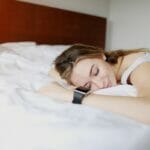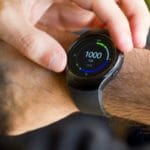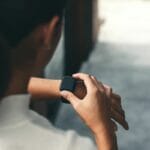Fitbit devices have become increasingly popular for not only helping users track their daily fitness goals, but also for monitoring and assessing sleep patterns. As wearable technology continues to advance, many people wonder just how accurate Fitbit’s sleep tracking features are and whether they can provide insights into their overall sleep quality.

The accuracy of Fitbit’s sleep tracking features primarily depends on the device’s ability to detect and categorize your movement during sleep. Factors such as restlessness or excessive movement during the night could affect the data collected. However, with consistent use and the understanding of the device’s limitations, it can still offer valuable information on your sleep routine and potential areas for improvement.
Key Takeaways
- Fitbit devices track and categorize sleep by monitoring movement, offering insights into sleep quality
- Accuracy can be affected by restless or excessive movement during sleep, but consistent use helps paint an accurate picture
- Fitbit sleep data can be useful for identifying areas of improvement in your sleep routine
How Fitbit Tracks Sleep
Fitbit devices are known for their ability to track various aspects of your daily activities, including sleep. To help you understand your sleep patterns better, Fitbit uses a combination of movement and heart rate data to provide insights into your slumber. In this section, we’ll explore how Fitbit captures this data and the importance of each sleep stage.
Sleep Stages Tracked by Fitbit
Fitbit devices are designed to track the three primary sleep stages: REM (Rapid Eye Movement), light sleep, and deep sleep. These stages play a crucial role in your overall wellbeing and are essential for your body’s recovery.
- REM sleep is the stage where you experience most vivid dreams, and it is also essential for memory consolidation and learning.
- Light sleep is crucial for maintaining alertness, as it makes up a considerable portion of your night.
- Deep sleep is the most restorative stage, during which your body repairs muscles, grows tissue, and strengthens the immune system.
By tracking these sleep stages, Fitbit can help you identify patterns and trends that may impact your overall sleep quality.
Role of Heart Rate and Movement in Sleep Tracking
Fitbit devices use an accelerometer and heart rate monitor to track your sleep stages. The accelerometer detects your body’s movements throughout the night, while the heart rate monitor measures your pulse during sleep. These two pieces of data are then combined to provide a comprehensive picture of your sleep patterns.
For example, if the accelerometer detects minimal movement and your heart rate is steady, Fitbit may interpret this data as an indicator of deep sleep. On the other hand, increased movement or an elevated heart rate can signal that you’re in a lighter sleep stage or experiencing a disruptive event, such as sleepwalking or night terrors.
In conclusion, using the combination of heart rate and movement data, Fitbit devices offer valuable insights into your sleep patterns, helping you understand your sleep stages better and make informed decisions to improve your overall sleep quality.
Fitbit and Sleep Quality Insight
Understanding Sleep Score
Fitbit provides you with a sleep score to help assess your sleep quality. These scores typically range from 0 to 100, with higher scores indicating better sleep quality. By understanding how your sleep score is calculated, you can gain valuable insights into your sleep habits and make positive changes to optimize your rest.
Fitbit’s Insight on Sleep Duration
Sleep duration plays an essential role in your overall health. Fitbit can track and analyze your sleep patterns, providing you with information on how long – and how well – you sleep at night. This information helps you make informed decisions about improving your sleep habits and, in turn, boosting your overall well-being.
Remember to regularly check your sleep log in the Fitbit app to see how your personal stats compare with recommendations and maintain a healthy sleep schedule.
Effect of Wearables on Sleep Routine
Fitbit and other wearable devices are becoming increasingly popular for tracking and improving sleep habits. This section will discuss how Fitbit can have an impact on your bedtime, wake time, and overall sleep routine.
Influence on Bedtime and Wake Time
A key aspect of a healthy sleep routine is maintaining consistent bedtimes and wake times. Using a Fitbit can help you achieve this by allowing you to set desired bedtimes and wake times. Once set, your Fitbit will remind you when it’s time to start preparing for bed and when it’s time to wake up. This can help you develop and maintain a consistent sleep schedule, which enables your body to regulate its natural sleep-wake cycle more effectively. In turn, this leads to a better quality of sleep and increased daytime alertness.
Impact on Sleep Habits
Beyond bedtime and wake time, incorporating a Fitbit into your sleep routine can have broader effects on your overall sleep habits. One of the key benefits of Fitbits is the ability to monitor your sleep patterns, including total sleep time, sleep efficiency, and the duration of each sleep stage. Having access to this data allows you to better understand your personal sleep habits and identify areas for improvement.
For example, if your Fitbit data shows that you are experiencing a low sleep efficiency, you can recognize the need to adjust your sleep schedule or make changes to your bedtime routine. Additionally, by analyzing the data, you could identify patterns that impact your sleep quality, such as exercise, caffeine consumption, or daytime napping.
Moreover, a Fitbit can provide you with personalized sleep coaching based on your sleep data, offering helpful tips and recommendations to improve your sleep quality. This guidance can lead to more effective sleep habits and overall improved well-being.
To summarize, using a Fitbit can have a significant influence on your sleep routine by helping you regulate bedtime and wake time, better understand your sleep habits, and make informed adjustments to improve sleep quality. So, go ahead and take advantage of these modern wearables to enhance your sleep and overall health.
Advanced Fitbit Sleep Features
Fitbit devices offer a range of sleep tracking features to help users better understand their sleep patterns. In this section, we will discuss two advanced features: Sleep Staging and Smart Wake and Fitbit Premium and Estimated Oxygen Variation.
Sleep Staging and Smart Wake
One of the advanced features of some Fitbit models is the ability to monitor sleep stages. These devices use heart rate variability and body movement data to assess when you are experiencing light sleep, deep sleep, or REM sleep. By understanding your sleep stages, you can work towards improving your overall sleep quality.
Fitbit devices also include a Smart Wake feature. This smart alarm is designed to wake you up at the optimal moment within a specified time range by monitoring your sleep stage. Rather than jolt you awake from a deep sleep, Smart Wake gently rouses you during a period of light sleep, making it easier to wake up feeling refreshed.
Fitbit Premium and Estimated Oxygen Variation
For more detailed and personalized sleep insights, Fitbit offers a subscription service called Fitbit Premium. Priced at $9.99 per month, this service provides users with a comprehensive sleep score that factors in various aspects of their sleep, such as duration, quality, and restfulness. Fitbit Premium members can also access guided sleep programs and personalized coaching to support their sleep improvement journey.
Additionally, with Fitbit Premium, users can access their Estimated Oxygen Variation data during sleep. While Fitbit devices do not claim to detect sleep apnea, monitoring oxygen levels can offer valuable insights into your sleep quality. By looking at the fluctuations in your oxygen levels throughout the night, you may have a better understanding of potential disruptions and overall sleep quality.
To make the most of these advanced Fitbit sleep features, be sure to follow the proper setup instructions on the Fitbit app. With these tools in hand, you can work towards improving your sleep and overall well-being.
Sleep Tracking Accuracy of Fitbit Devices
Comparing Versa Series and Charge Models
Fitbit offers a range of devices with sleep tracking capabilities, such as the Versa series, including the Fitbit Versa and Versa 2, as well as the Ionic and the Charge series like the Charge 4. The accuracy of sleep tracking can vary between models, but generally speaking, these devices provide useful insights into your sleep patterns.
The Versa series and Ionic models use a combination of heart rate variability and body movement to assess sleep stages and overall sleep quality. The Charge series, including the Charge 4, also use heart rate and movement data to provide a comprehensive picture of your sleep.
Reliability of Fitbit’s Sleep Metrics
While Fitbit devices are known for providing valuable information about your sleep, it’s important to remember that they might not be 100% accurate in all cases. Factors such as the snugness of the device on your wrist and proper syncing with the Fitbit app can influence the accuracy of the sleep data.
When it comes to the reliability of specific sleep metrics, Fitbit devices can correctly identify sleep with accuracy values ranging from 0.81 to 0.91. Sensitivity values can be between 0.87 and 0.99, while specificity values can fall between 0.10 and 0.52. A higher sensitivity indicates better detection of sleep epochs, while a higher specificity indicates better detection of wake periods.
For optimal results, ensure that your device is worn snugly on your wrist, and maintain consistent sleep habits. Additionally, properly sync your device with the Fitbit app, keep the firmware updated, and follow the device’s sleep tracking guidelines. By taking these steps, you can maximize the accuracy and reliability of your Fitbit’s sleep metrics.
Fitbit Versus Other Sleep Trackers

When it comes to sleep tracking, Fitbit is a popular choice among fitness trackers. With its variety of models, like the Fitbit Ace 3, it offers a range of features designed to help you monitor your sleep patterns. But how does Fitbit stack up against other sleep tracking devices in terms of accuracy and features?
Fitbit Sleep Tracking Features
Fitbit provides insights into your sleep, including duration, sleep stages, and sleep quality. To get a clearer understanding of your sleep patterns, you’ll want to explore the Fitbit app on your smartphone, which offers more detailed information than the screen of your Fitbit device. The app also provides you with a Fitbit Sleep Score, which can help you track improvements over time. However, keep in mind that accessing some advanced features requires a Premium subscription costing $9.99 per month.
Accuracy
It’s important to note that while Fitbit devices are known for their accuracy in tracking steps and heart rate, their sleep tracking capabilities might vary. Some users find difficulty in determining sleep stages accurately, while others have better experiences with the tracking feature. As technology continues to improve, you can expect enhancements in sleep tracking accuracy with newer Fitbit models.
Fitbit Versus Other Sleep Trackers
Fitbit has many competitors in the sleep tracking market, such as Apple Watch, Garmin, and Oura Ring. Each device offers its unique set of features and methods for tracking sleep. While some sleep trackers, like Apple Watch, lean more towards providing overall fitness and wellbeing support, others focus primarily on sleep, like the Oura Ring.
In conclusion, it’s essential for you to decide what level of detail and accuracy you require from a sleep tracker. Fitbit may be the perfect choice for those seeking a comprehensive fitness tracker with sleep tracking capabilities. On the other hand, specific sleep trackers that focus solely on sleep might be more suitable for those wanting detailed, accurate insights into their sleep patterns.
Limitations and Considerations

When using a Fitbit for sleep tracking, it’s important to keep in mind that although it may provide valuable insights into your sleep patterns, there are a few limitations and considerations to take into account.
First, it’s worth noting that Fitbits may not be as accurate as polysomnography, which is considered the gold standard for measuring sleep stages. Nonetheless, Fitbit devices still estimate your total sleep time and sleep efficiency reasonably well, using multisensory data like heart rate variability and body movement. However, they might overestimate total sleep time and efficiency to a certain degree1.
Fitbit accuracy can also be affected by free-living conditions. While controlled environments may provide more accurate readings, wearing your Fitbit during normal daily activities might cause a higher error rate2. This means that you should take the readings with a grain of salt and consider the potential for discrepancies.
As Fitbits rely on sensing movements and detecting various physiological changes to provide insights into your sleep, device placement and body motion play a role in the accuracy of measurements. Be sure to follow the Fitbit instructions for proper placement to ensure optimal accuracy.
Another important consideration is battery life. It’s crucial to ensure that your Fitbit device is adequately charged, as a low battery might impact the accuracy of your sleep data. To make the most out of your Fitbit device and prolong its battery life, you can follow some helpful tips on how to prolong the lifespan of your Fitbit battery. Keep your Fitbit charged and ready to use to ensure your sleep data is as reliable as possible.
Lastly, remember that while sleep tracking with a Fitbit can provide valuable information, it should not be considered a diagnostic tool for sleep disorders. Always consult with a healthcare professional if you have concerns about your sleep health.
Incorporating Fitbit Data in Lifestyle

Integrating Fitbit data into your lifestyle can be a valuable way to monitor and improve your sleep quality. The sleep tracking features of Fitbit devices help you track your sleep history and understand how many hours you’ve slept.
One potential use for Fitbit sleep data is to establish a sleep schedule. By analyzing the hours you’ve slept over time, you can identify patterns and set sleep goals for yourself. Armed with this information, you can take steps to optimize your bedtime routine and create a more consistent sleep schedule that benefits your overall health and wellbeing.
Another aspect to consider is using your Fitbit sleep data to adjust your daily lifestyle choices. For example, you might notice that you sleep better on nights when you exercise, practice meditation, or follow a specific pre-bedtime ritual. Paying attention to these trends can lead to better-informed decisions and habits, ultimately enhancing your sleep and overall wellbeing.
Should you ever need to delete your Fitbit account, there is a simple process for doing so, which includes removing all associated data, such as sleep history, activity logs, and connected apps. You can learn how to complete this process by following the steps explained here.
In short, integrating Fitbit sleep data into your lifestyle can be an effective and user-friendly method to track and improve your sleep, ultimately leading to better overall health and self-awareness.
Conclusion

Fitbit devices are popular for their ability to track various health metrics, including sleep tracking. As you may have wondered about the accuracy of these devices in assessing sleep, it’s essential to understand some key findings.
According to a systematic review, Fitbit models without sleep staging tend to overestimate total sleep time and sleep efficiency. However, they are generally considered accurate for tracking step counts. You should also be aware that having a restless sleep or excessive movements during the night can affect the device’s accuracy in detecting and classifying different sleep stages.
To improve the accuracy of your sleep tracker on Fitbit, make sure to wear the device snugly on your wrist during sleep and sync it properly with the Fitbit app. Keep the firmware updated and follow the device’s sleep tracking guidelines. Maintaining consistent sleep habits and ensuring proper placement of the wearable will enhance its accuracy.
In summary, while Fitbit devices might not be perfect in tracking sleep, they still provide valuable insights into your sleeping patterns. By following the recommendations mentioned above, you can maximize the benefits of using a Fitbit for sleep tracking and better understand your sleep habits. Remember, a good night’s sleep plays a vital role in maintaining your overall health and well-being.
- How to Clean a Leather Watch Band: Quick & Easy Tips for a Fresh Look! - July 7, 2025
- How to Connect Bose Speaker to iPhone: Exciting and Easy Steps! - July 6, 2025
- Best Cheap Bluetooth Headphones - July 6, 2025






